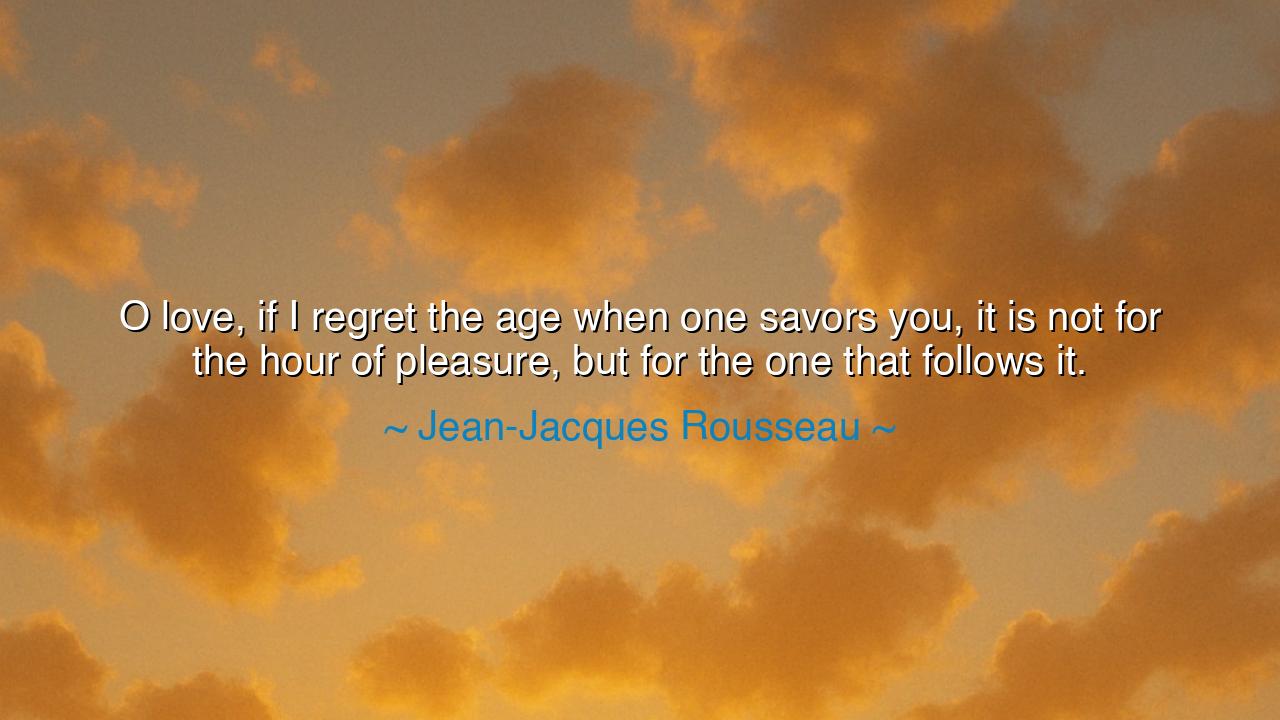
O love, if I regret the age when one savors you, it is not for
O love, if I regret the age when one savors you, it is not for the hour of pleasure, but for the one that follows it.






The philosopher and dreamer of the human heart, Jean-Jacques Rousseau, once wrote: “O love, if I regret the age when one savors you, it is not for the hour of pleasure, but for the one that follows it.” In this tender confession lies the ache of wisdom — the recognition that love’s truest beauty is not in its fire, but in its afterglow, in that sacred hour when passion has passed and the heart trembles between memory and loss. Rousseau, who lived as both lover and philosopher, speaks here not as a moralist, but as a soul who has tasted the sweetness of desire and the sorrow that always shadows it. His words are not a lament for lost pleasure, but for the quiet, aching moment that follows — when love, having burned bright, leaves behind the luminous ashes of remembrance.
The origin of this quote comes from Rousseau’s Confessions, a work unlike any other of its time — the first great autobiography of the modern age, in which the author bares his heart with unflinching honesty. In it, Rousseau revisits the passions of his youth, not with shame, but with reflection. He speaks of love as the great teacher of the human condition — a force both divine and dangerous, capable of exalting the soul and undoing it. When he writes of “the hour that follows pleasure,” he captures the moment when the fever of passion cools and the spirit confronts itself. That hour is not empty; it is full of longing, full of the haunting beauty of what has just been lived. It is the echo that makes the music of love endure long after the song itself is over.
Rousseau’s words reveal an eternal truth: that the beauty of love lies not in possession, but in its passing. The young, consumed by desire, chase the moment of ecstasy — the height of union, the triumph of passion. But the wise, as Rousseau reminds us, learn to treasure the silence that follows, when love’s flame fades into warmth, and the heart becomes still enough to feel gratitude. It is in that quiet hour that love shows its truest face — not as pleasure, but as meaning. The hour after love is the hour of reflection, of tenderness, of the bittersweet knowledge that all joy is fleeting, and therefore sacred.
Consider the story of Antony and Cleopatra, whose love burned brighter than the crowns they wore. Their moments of passion were fierce, defiant of empire and fate. Yet history remembers not their kisses, but their final hour — that tragic moment when, surrounded by ruin, they chose death together rather than separation. It was in that hour, not of pleasure but of consequence, that their love became immortal. Their story mirrors Rousseau’s insight: the truest depth of love is revealed not in its height of joy, but in what follows — the devotion, the pain, the remembrance that lingers like incense after a flame.
The meaning of Rousseau’s lament is not merely romantic. It is a meditation on time and the human soul. He does not mourn the loss of pleasure; he mourns the loss of intensity — the vividness of life that love once brought. As age advances, the passions cool, and the heart, though still capable of affection, no longer trembles as it once did. Yet in that cooling lies a different kind of wisdom: the understanding that love is not measured by its fire, but by its endurance, its echo. Rousseau teaches that when we look back upon our loves, it is not the pleasure we miss, but the way we once felt alive. Love, then, is both the fire and the memory of warmth — and to lose either is to lose part of the soul’s music.
This truth can be felt in every life. The young chase love as though it will make them whole; the old remember it as though it once did. But Rousseau’s words remind us that love’s true gift is not fulfillment, but awareness. The hour after passion — that still, reflective space — teaches humility, gratitude, and longing. It reminds us that beauty cannot be held, that joy is precious precisely because it passes. To live wisely is to savor not only the embrace, but the parting; not only the song, but the silence that follows.
The lesson, then, is clear and timeless: cherish the hours that follow love as much as those that burn within it. Do not seek to hold love captive, for it lives only in freedom, and its fleeting nature is its grace. When passion fades, do not grieve; let memory refine it into tenderness. Reflect upon your loves — not to mourn what has ended, but to honor what was real. For every true love, whether lasting or brief, leaves behind a glow that illuminates the heart long after the fire is gone. To regret the hour after love is to recognize how deeply one has lived — and how sacred it is to have loved at all.
Thus remember, O traveler of the heart, that love’s greatness lies not in the storm, but in the calm that follows. Pleasure is the spark, but remembrance is the light that endures. When the fire of love passes, sit in its warmth; let the stillness teach you gratitude. For the hour after love — that soft, aching hour Rousseau speaks of — is the moment when the soul, stripped of illusion, learns the quiet truth of beauty: that all things must pass, yet nothing that is truly loved is ever lost.






AAdministratorAdministrator
Welcome, honored guests. Please leave a comment, we will respond soon